"The Berry Best"
July 02, 2009 - Volume 1 - Issue 13
|
|
|
| Away on Vacation |
Beyond Pots and Pans will be taking a break this summer and will be closed beginning July 4th through July 20. We'll reopen Tuesday, July 21st at 10:00am. Hope to see you before and after!
|
|
|
Berry Wonderful!
|
The
berries are back! We're talking "real" berries - the kind that burst
with flavor tantalizing every taste bud in the process. Real berries
are not bred for cross-country transportation like some imposters;
they're the original thing - juicy, sweet, still warm from the sun.
These summer ephemerals invite immediate enjoyment during picking -
"one for the basket, one for me." Inundated with a momentary bounty,
berries become jewels in the kitchen and the inspiration for some truly
seasonal favorites.
In
this issue we review the world of berries, the common and the less
common, and discuss how to keep your berries at their best. We conclude
with a primer on fresh fruit pies and three berry pie recipes ranging
from an all strawberry double-crust, to a crumb-topped red raspberry
version, and, finally, a rustic, freeform mixed berry pie. Any one of
them will do justice to your berries and induce immediate swooning from
all those that partake of these summer gems.
|
Made in America Sale
|
 - We pay the sales tax on anything made in the USA!
- Plus, pay cash for anything American-made and receive an additional 5% discount.
Look throughout the store for the American flags!
|
A Special Upcoming Event
|
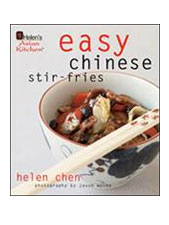
Cooking Class with Helen Chen
Monday, August 3 - 6:00pm. Join us for a special cooking class with Helen Chen as she cooks from her new cookbook, Easy Chinese Stir-Fries. She'll share her best secrets for creating healthy, fast, Chinese-style meals. $65. (The store will be closed from July 4 - 20, but if you'd like to attend this class, just send us an e-mail at info@beyondpotsandpans.com indicating your interest and we'll call you back to get you registered!) share her best secrets for creating healthy, fast, Chinese-style meals. $65. (The store will be closed from July 4 - 20, but if you'd like to attend this class, just send us an e-mail at info@beyondpotsandpans.com indicating your interest and we'll call you back to get you registered!) |
|
|
|
The World of Berries
|
Berries
comprise a big world in the garden and kitchen. We're quite familiar
with the year-round, commoditized version of strawberries, raspberries,
and blueberries, but it's the local berries that are the treat of the
season. Explore your local farmer's market or back road farm stands to
access the "real" thing and to expand your exposure to the wide variety
of berries available.
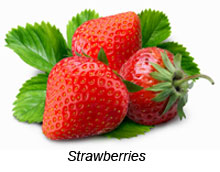 Strawberries
- Red, heart-shaped, very well-known, this berry reigns supreme in the
kitchen at this time of year. Strawberries are unique in the plant
world by virtue of wearing their seeds on the outside - all 244 of them
on average. Strawberries are a popular "u-pick" fruit; find a local
farm and you'll suddenly remember what a real strawberry is! Strawberries
- Red, heart-shaped, very well-known, this berry reigns supreme in the
kitchen at this time of year. Strawberries are unique in the plant
world by virtue of wearing their seeds on the outside - all 244 of them
on average. Strawberries are a popular "u-pick" fruit; find a local
farm and you'll suddenly remember what a real strawberry is!
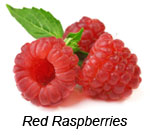 Red Raspberries
- Also a transient beauty, red raspberries are an aggregate fruit --
many little fruits grouped together into what is also known as a
"drupe." Different kinds of raspberry bushes have different harvest
times; look for them from early summer to early fall. Raspberries yield
a piquant flavor burst and grace many desserts, salad dressings, and,
of course, the popular framboise liqueurs. Red Raspberries
- Also a transient beauty, red raspberries are an aggregate fruit --
many little fruits grouped together into what is also known as a
"drupe." Different kinds of raspberry bushes have different harvest
times; look for them from early summer to early fall. Raspberries yield
a piquant flavor burst and grace many desserts, salad dressings, and,
of course, the popular framboise liqueurs.
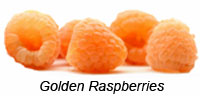 Golden Raspberries
- Similar to their red siblings, golden varieties are often available
locally during the micro seasons between the red raspberry harvests.
Golden raspberries are still just novel enough to create a double-take
when served. Golden Raspberries
- Similar to their red siblings, golden varieties are often available
locally during the micro seasons between the red raspberry harvests.
Golden raspberries are still just novel enough to create a double-take
when served.
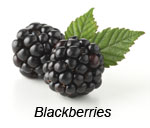 Blackberries
- Before it was a mobile communication device, "blackberry" referred to
another "drupe" fruit, many tiny fruits joined together. Distinct in
flavor, blackberries are a rich antioxidant food. Dewberries are a
close variation of the blackberry. (How did the PDA, BlackBerry®, get
its name? It's said that the branding company, looking for a unique
name for the product, thought that the collection of tiny keys was
reminiscent of tiny seeds. The device, originally black in color,
logically(?) became the BlackBerry®). Blackberries
- Before it was a mobile communication device, "blackberry" referred to
another "drupe" fruit, many tiny fruits joined together. Distinct in
flavor, blackberries are a rich antioxidant food. Dewberries are a
close variation of the blackberry. (How did the PDA, BlackBerry®, get
its name? It's said that the branding company, looking for a unique
name for the product, thought that the collection of tiny keys was
reminiscent of tiny seeds. The device, originally black in color,
logically(?) became the BlackBerry®).
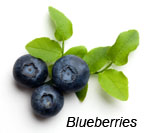
Blueberries
- The fruit of this shrubby plant is not really a berry, but we'll
ignore that for the moment. These iconic fruits vary from tiny, wild
varieties to the large, cultivated versions. One of the few true blue
foods, blueberries are a favorite in muffins, pancakes, and all ki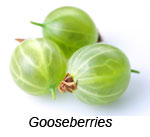 nds of desserts. nds of desserts.
Gooseberries -
These berries, also from a shrub, can vary in color from green, red or
purple. Similar in size to a small grape, their flavor is also
reminiscent of a sour grape. Use gooseberries in pies, jams, or eat the
riper ones out of hand.
 Currants
- Tiny and potent, currants come in red, white or black. Collectively
they pack a tart punch like many shrub berries. Their size and growth
habit make removing stem parts a bit of a challenge. Interestingly,
most dried currants are really raisins from the petite Zante grape. Currants
- Tiny and potent, currants come in red, white or black. Collectively
they pack a tart punch like many shrub berries. Their size and growth
habit make removing stem parts a bit of a challenge. Interestingly,
most dried currants are really raisins from the petite Zante grape.
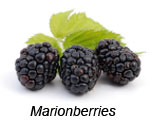 Marionberries
- This popular berry is a complicated hybrid of other drupe berries.
Most akin to a blackberry, it tends to be larger and sweeter. Produced
primarily in Oregon, many frozen and canned berries are actually
marionberries. Marionberries
- This popular berry is a complicated hybrid of other drupe berries.
Most akin to a blackberry, it tends to be larger and sweeter. Produced
primarily in Oregon, many frozen and canned berries are actually
marionberries.
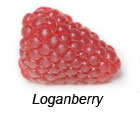 Loganberries
- A loganberry is a cross between a raspberry and a blackberry. They
are very juicy and sport a purplish-red color. Commercial availability
is limited, but can be a great addition to the home berry patch. (Watch
out for their extra thorny canes!) Loganberries
- A loganberry is a cross between a raspberry and a blackberry. They
are very juicy and sport a purplish-red color. Commercial availability
is limited, but can be a great addition to the home berry patch. (Watch
out for their extra thorny canes!)
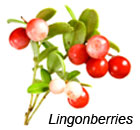 Lingonberries
- Often termed "mountain cranberries," these petite, red fruits are
borne by low-lying tundra shrubs, and are wildly popular in
Scandinavia. Tart and bitter on their own, they are commonly fashioned
into a sauce or jam. Lingonberries
- Often termed "mountain cranberries," these petite, red fruits are
borne by low-lying tundra shrubs, and are wildly popular in
Scandinavia. Tart and bitter on their own, they are commonly fashioned
into a sauce or jam.
Boysenberries
- Another cultivar, boysenberries are cross between a blackberry,
loganberry and raspberry. They're known for their distinctive, tart
flavor and are used like blackberries.
 Cloudberries
- Similar to a raspberry, cloudberries are an aggregate fruit with only
5 to 25 seeds grouped together. When ripe, they are amber in color and
have a characteristic tartness. Cloudberries
- Similar to a raspberry, cloudberries are an aggregate fruit with only
5 to 25 seeds grouped together. When ripe, they are amber in color and
have a characteristic tartness. 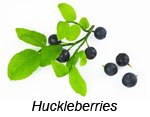 Another low-growing shrub, the plant is suited for northern climes and, again, very popular in Scandinavia. Another low-growing shrub, the plant is suited for northern climes and, again, very popular in Scandinavia.
Huckleberries
- Most like a blueberry in form, huckleberries can range from red to
purple and are found in late summer. They thrive in cooler, elevated
climates which makes them less accessible for commercialization and all
the more special.
|
|
Berries at their Best
|
Berries
at their peak are fragile in nature and require some diligent
management. Some close attention to their handling will keep them at
their berry best!
Seek out Local Sources
-- As previously noted, berries harvested locally have the best chance
for freshness and taste. Many supermarket berries have been bred for
prolonged, cross-country travel. This breeding has often come at the
cost for taste. Find "u-pick" sources for berries and plan a berry good
day for yourself and a few friends. Plan to use your harvest as soon as
possible.
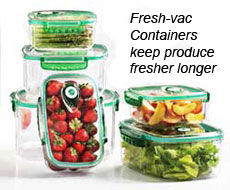 Choose Good Berries
- Great berries have a firm appearance, free of wrinkles or mushiness.
Fully developed, rich reds, blues and purples will indicate ripeness.
Under ripe berries will be too tart and tough; sort out and discard
immature berries. Choose Good Berries
- Great berries have a firm appearance, free of wrinkles or mushiness.
Fully developed, rich reds, blues and purples will indicate ripeness.
Under ripe berries will be too tart and tough; sort out and discard
immature berries.
Mold Susceptibility
- Berries that sit in a container are susceptible to mold development.
Regrettably, one moldy berry will affect the taste of the entire box.
Sometimes mold is not visible in berry containers; instead, smell the
berries to check for any hint of mold.
Store Carefully
- Being fragile, plan on storing unwashed berries for the least amount
of time possible. If possible, store refrigerated in a single layer in
a covered container. 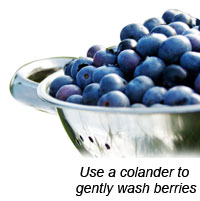 Decreasing
the weight of the berries on each other will keep them from bruising
and becoming mushy. Store away from apples and bananas whose ethylene
gas will cause the berries to degrade more quickly. Decreasing
the weight of the berries on each other will keep them from bruising
and becoming mushy. Store away from apples and bananas whose ethylene
gas will cause the berries to degrade more quickly.
Wash Gently
- Wash berries just before using. Using a colander, gently spray water
over the berries a few at a time. Roll the berries around to access all
sides; refrain from tossing the berries as this may cause bruising.
Allow the berries to drain, then spread in a single layer on paper
towels to dry. With their internal cavity, raspberries should be
individually inverted on the paper towels to drain effectively. Let the
berries air dry for several minutes before using. Do not allow berries
to stand in water, or even in contact with droplets of water.
Serve Fresh
- Serve berries fresh in salads, as a topping, and certainly as the
centerpiece of any number of desserts. Berry bowls are perfect for the
season. These two part dishes have holes in the bottom of the bowl that
drain any excess water or juice away from the berries to the saucer
below.
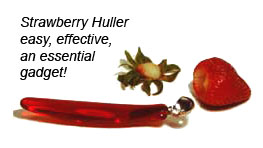 Freeze Ahead
- Dealing with a bounty of berries all at once is challenging. Freezing
the berries is a perfect solution that brings rewards well past the
harvest season. Wash the berries in the method noted above. Hull or
stem the berries. Place the berries in a single layer on a baking sheet
and freeze until solid. Once completely frozen, bag the berries in a
freezer-grade zipper bag. Freeze Ahead
- Dealing with a bounty of berries all at once is challenging. Freezing
the berries is a perfect solution that brings rewards well past the
harvest season. Wash the berries in the method noted above. Hull or
stem the berries. Place the berries in a single layer on a baking sheet
and freeze until solid. Once completely frozen, bag the berries in a
freezer-grade zipper bag.
|
Summer Fruit Pies
|
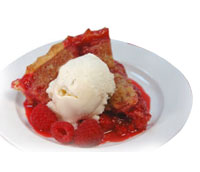 Second only to eating berries out of hand, enjoying them in a pie is sublime. Summer
fruit pies make great use of the overwhelming quantities that suddenly
become available in our gardens or fresh markets. There are a few
tricks to making great summer fresh fruit pies - we'll share some here: Second only to eating berries out of hand, enjoying them in a pie is sublime. Summer
fruit pies make great use of the overwhelming quantities that suddenly
become available in our gardens or fresh markets. There are a few
tricks to making great summer fresh fruit pies - we'll share some here:
Start with a Great Crust
- We meet people everyday that are intimidated by making their own pie
crust. It's really quite easy and once mastered will set you apart from
those unwilling to tackle the topic. Here are some of our best tips for
making a great pie crust:
- Chill the butter or shortening well
- Use ice cold water
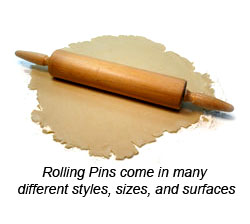 Don't over mix the dough Don't over mix the dough- Make
dough in a food processor, with an electric mixer, or by hand with a
pastry blender; avoid using your hands as their heat will adversely
affect the outcome
- Chill the dough slightly once mixed
- Use wax paper to roll out the dough
- Chill the crust in the pie plate for a few minutes prior to adding the filling
- Brush the edge of the bottom crust with water or milk to make a good seal with the top crust
- Glaze
the top of the crust with a brushing of cream and a generous sprinkling
of sugar; the result will be a gorgeous, golden crust.
Finesse the Filling
- Summer fruit pies are known for their juiciness! It's the best part
of a berry pie and the most challenging aspect. Most recipes call for
using cornstarch or quick-cooking tapioca to thicken the pie filling.
When sugar is added to fruit, it draws out the juices. Also, when fruit
is heated the juices appear. The cornstarch or tapioca will thicken the
exuded juices and provide a more cohesive pie filling when served.
Match the quantity of fruit and thickener according to the recipe. If
more fruit is used, increase the amount of thickener.
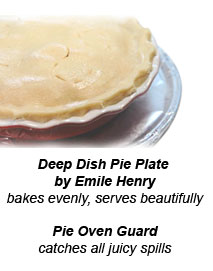 Bake Carefully
- Keep an eye on your pie as it bakes. Juicy fruits will produce a
bubbly pie in the oven. It can be common for the juices to bubble over
and out of the pie. Anticipate this potentially messy situation with a
catch pan underneath the pie. We like to use the popular Oven Ring
product that catches the juices before they hit the oven rack. The
spilled juices with their high sugar content will burn easily. Bake Carefully
- Keep an eye on your pie as it bakes. Juicy fruits will produce a
bubbly pie in the oven. It can be common for the juices to bubble over
and out of the pie. Anticipate this potentially messy situation with a
catch pan underneath the pie. We like to use the popular Oven Ring
product that catches the juices before they hit the oven rack. The
spilled juices with their high sugar content will burn easily.
Serving Pie
- Allow your berry pie to cool at least to room temperature before
serving. This time and temperature adjustment will allow the filling to
set up. Cut the pie and lift with a wedge-shaped spatula. There's
really no substitute for a pie server. The pie slices need the
customized wedge support to lift and move the pastry without disaster.
If the berry pie is still quite juicy after baking, don't worry about
it! Enjoy it thoroughly, then note on the recipe the need for more
thickener the next time around.
|
Smart Berry & Pie Tips
|
Tip #1:
With a bunch of berries in hand, a berry smoothie is not too far away.
Use one cup of vanilla yogurt with an equal amount of berries. Blend
until smooth. Alternatively, for a frozen smoothie, add equal parts ice
cubes and berries; add sugar and lemon to taste.
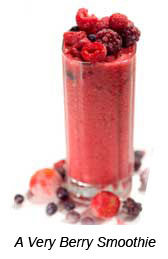
Tip #2:
Berries, difficult to wash, are one of top ten fruits recommended for
organic purchase based on tests measuring the presence of residual
pesticides. Other fruits and vegetables to be purchased organically
include: nectarines, celery, pears, peaches, apples, cherries, imported
grapes, lettuce, spinach, potatoes, and bell peppers.
Tip #3:
Strawberries lose their bright, red color when cooked and can turn a
grayish purple. However, much of the redness is retained with the
addition of some type of acidic ingredient such as lemon juice or
another citrus juice. The acidic character of rhubarb makes the classic
strawberry-rhubarb a natural.
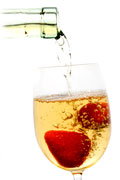 Tip #4: Declare that it's
summer by dropping a berry into a glass of white
wine or champagne to treat the eye and infuse a hint of berry in your drink. Tip #4: Declare that it's
summer by dropping a berry into a glass of white
wine or champagne to treat the eye and infuse a hint of berry in your drink.
Tip #5:
Berry pies are perfect for freezing. Since berries do not oxidize and
turn brown, they retain their character well. Freeze berry pies in one
of two ways: (1) Mix and freeze the filling in a zippered freezer bag
set in a pie plate so that it freezes in a pie shape, or (2) Assemble
the pie crust, single or double, and fill with the berries; wrap well
and freeze. Add 15-20 minutes to the baking time for a frozen pie.
Tip #6:
Use a serrated knife to cut the pie. The serrated edge will "saw"
through a well-made flaky crust without crushing it to crumbs.
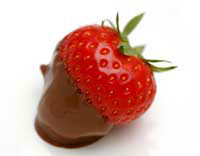 Tip# 7: Make extra pie
crust dough each time you mix a batch and store the extra crust as a
flat disc in the freezer. You'll have half the work of a fresh fruit
pie done with this do-ahead strategy. Tip# 7: Make extra pie
crust dough each time you mix a batch and store the extra crust as a
flat disc in the freezer. You'll have half the work of a fresh fruit
pie done with this do-ahead strategy.
Tip #8:
Chocolate-covered strawberries are always a welcomed treat. Using
washed, dried strawberries, dip in melted chocolate and place on a
baking sheet lined with wax paper. If you use a fine quality chocolate
with a high cacoa content, and heat it ever so gently, you will not
need any other ingredients for a perfect couverture.
|
Q & A's
|
 Q: What is the difference between a "crisp," a "cobbler," and a "bumble?" Q: What is the difference between a "crisp," a "cobbler," and a "bumble?"
A: 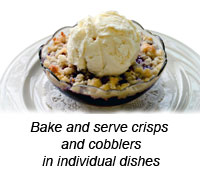 A
fruit crisp has a crumble topping made of flour, butter, and salt with
oatmeal, cinnamon, or nuts added occasionally. The ratio is such that
the crumble holds together slightly and browns into a lovely top crust.
A cobbler varies by region, but usually involves a batter poured over
fruit that when baked forms a cake-like filling between the fruit
pieces. A bumble is a jumble of whatever berries are available at the
moment, and may be turned into a bumble crisp, bumble cobbler, or a
bumble berry pie! A
fruit crisp has a crumble topping made of flour, butter, and salt with
oatmeal, cinnamon, or nuts added occasionally. The ratio is such that
the crumble holds together slightly and browns into a lovely top crust.
A cobbler varies by region, but usually involves a batter poured over
fruit that when baked forms a cake-like filling between the fruit
pieces. A bumble is a jumble of whatever berries are available at the
moment, and may be turned into a bumble crisp, bumble cobbler, or a
bumble berry pie!
Q: What does the cooking term "macerate" mean?
A:
Macerating berries or other fruit is the process of drawing out the
fruits' liquid and allowing them to become soft in the process. By
adding sugar to berries, the osmolarity outside the berry differs from
inside the berry. Since nature seeks balance, liquid is released from
the berry in an attempt to dilute the sugar. This process is known as
maceration and has the effect of wilting the berry.
Q: What are the highly touted health benefits of berries?
A:
Berries are high in many vitamins including Vitamins C and K, but also
possess extraordinary amounts of polyphenol antioxidants. In lay terms,
antioxidants soak up radical versions of molecules that would otherwise
create havoc in our bodies. Foods' antioxidant properties are measured
for their ORAC - oxygen radical absorption capacity - and berries are
at the top of the ORAC chart!
Q: What is a lattice pie crust and how is it formed?
A:
Summer fruit pies must be well-vented due to the steam build-up from
the juicy filling. A lattice pie crust with "woven" strips placed on
top of the pie will help to thicken the filling through evaporation
while baking. Cut strips of rolled pie crust about 3/4-inch in width.
Lay 5 or 6 strips across the pie in one direction. Fold back the strips
exposing one-half the pie. In the center, begin to lay another strip
perpendicularly or at a diagonal. Gradually weave the strip under and
over the existing strips by partially unfolding the first layer.
Continue adding strips to the exp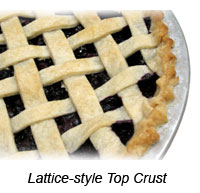 osed
half of the pie in a similar fashion. Complete the other half of the
pie by folding back the first layer of strips and adding strips as with
the first half. Brush the lattice work with cream and sprinkle with
sugar prior to baking. osed
half of the pie in a similar fashion. Complete the other half of the
pie by folding back the first layer of strips and adding strips as with
the first half. Brush the lattice work with cream and sprinkle with
sugar prior to baking.
Q: What's the best way to remove berry stains?
A:
The deep, rich colors of berries can produce stains on clothing and
tablecloths. Home remedies include the following tips: (1) Rub the spot
with a slice of lemon and rinse, 2) Scrub the stain with an
"extra-whitening" toothpaste, then rinse, (3) Soak in distilled, white
vinegar, then rinse and wash, and (4) Lighten any residual stain by
placing the item in sunlight.
|
Cookbook Review
|
Pie by Ken Haedrich. Copyright 2004. Published by Harvard Common Press, Boston, MA.
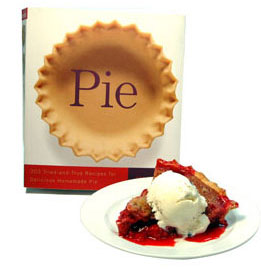 We
love pie! Coming upon a cookbook that is nothing but pie is sublime.
Mr. Haedrich also loves pie! That's clear in his writing and
first-hand narrative accompanying each of the more than 300 recipes.
For many of us, certain pies have a genealogy accompanying them that
makes for more than just a good dessert; they become the embodiment of
family culinary traditions. Here's your chance to refresh some of those
memories or to start some new ones. The cookbook is organized
seasonally by types of pie fillings - Berry Good Pies, Classic Fall
Pies, Nut Pies, Custard Pies, Cream Pies, Chiffon Pies, Ice Cream
Freezer Pies, and an entire chapter just for Apple Pies. The repertoire
of pies is preceded by a detailed chapter on pie crusts - how to make a
good crust, how to choose the right crust for different pies, and 21
different crust recipes. Each recipe contains a notes section entitled,
"Recipe for Success," that contains invaluable tips and hints for the
specific recipe. It's like having a well-known pie mentor at your side
at all times. The collection of assembled pies is a worthy homage to
this always appropriate dessert. We
love pie! Coming upon a cookbook that is nothing but pie is sublime.
Mr. Haedrich also loves pie! That's clear in his writing and
first-hand narrative accompanying each of the more than 300 recipes.
For many of us, certain pies have a genealogy accompanying them that
makes for more than just a good dessert; they become the embodiment of
family culinary traditions. Here's your chance to refresh some of those
memories or to start some new ones. The cookbook is organized
seasonally by types of pie fillings - Berry Good Pies, Classic Fall
Pies, Nut Pies, Custard Pies, Cream Pies, Chiffon Pies, Ice Cream
Freezer Pies, and an entire chapter just for Apple Pies. The repertoire
of pies is preceded by a detailed chapter on pie crusts - how to make a
good crust, how to choose the right crust for different pies, and 21
different crust recipes. Each recipe contains a notes section entitled,
"Recipe for Success," that contains invaluable tips and hints for the
specific recipe. It's like having a well-known pie mentor at your side
at all times. The collection of assembled pies is a worthy homage to
this always appropriate dessert.
|
Summer Berry Pies
|
Recipes excerpted from Pie
by Ken Haedrich. Copyright 2004. Published by Harvard Common Press,
Boston, MA. Used with permission from the publisher. All rights
reserved.
All Strawberry Pie
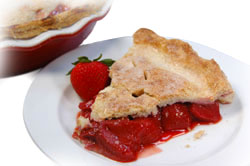 This
pie makes excellent use of the profusion of summer strawberries! The
pie dough mixed easily, and rolled cooperatively into a perfect crust.
The splash of lemon and spoonful of crème de menthe brightened the
flavors of the filling without a hint of confusion. It's a perfect way
to celebrate strawberries - we think you'll agree! This
pie makes excellent use of the profusion of summer strawberries! The
pie dough mixed easily, and rolled cooperatively into a perfect crust.
The splash of lemon and spoonful of crème de menthe brightened the
flavors of the filling without a hint of confusion. It's a perfect way
to celebrate strawberries - we think you'll agree!
Click here to view the illustrated recipe.
Click here for a printable version of the recipe.
Patsy's Mixed Berry Freeform Pie
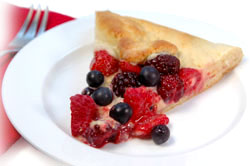 Many
berries become available all at once. No worries - they love to be
mixed together in just about any combination. The deep reds, blues and
purples are a visual delight and an antioxidant-rich jackpot! This
recipe uses a "healthy" crust that sports lower calories and less fat
compared to most other crust formulations. The freeform nature makes
for a rustic, yet stunning result. Many
berries become available all at once. No worries - they love to be
mixed together in just about any combination. The deep reds, blues and
purples are a visual delight and an antioxidant-rich jackpot! This
recipe uses a "healthy" crust that sports lower calories and less fat
compared to most other crust formulations. The freeform nature makes
for a rustic, yet stunning result.
Click here to view the illustrated recipe.
Click here for a printable version of the recipe.
Vid and Annie's Fresh Raspberry Crumb Pie
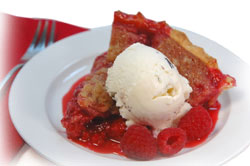 Raspberries
are showcased at their best in this pie. A top crumb crust combines the
best of a fruit crisp with the soul of a pie yielding some type of
summer nirvana! Wonderfully delightful on its own, we heard it calling
for a scoop of vanilla and so obliged. It's a thrilling experience --
enough to make one install a personal patch of raspberry bushes to
insure this pie as an annual event. Raspberries
are showcased at their best in this pie. A top crumb crust combines the
best of a fruit crisp with the soul of a pie yielding some type of
summer nirvana! Wonderfully delightful on its own, we heard it calling
for a scoop of vanilla and so obliged. It's a thrilling experience --
enough to make one install a personal patch of raspberry bushes to
insure this pie as an annual event.
Click here to view the illustrated recipe.
Click here for a printable version of the recipe.
|
 |
Predictably, we close with one last pun - "we wish you the berry best of summer cooking."
|
|
Lorraine, Katie, and all of the Staff at Beyond Pots and Pans
|
|
|
|
|